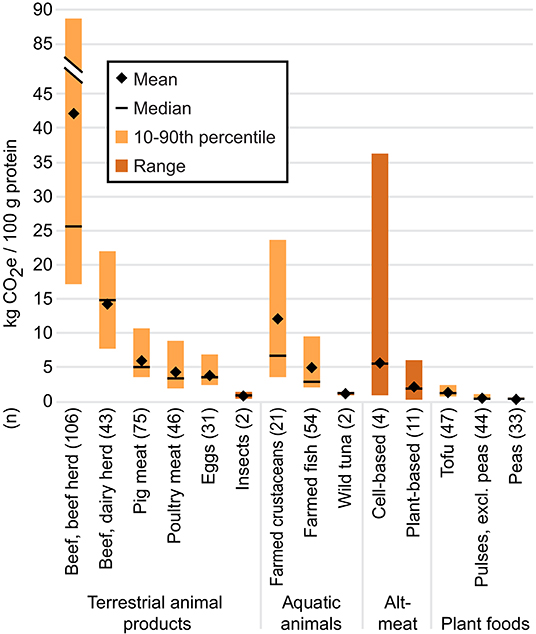In this paper, FCRN member Raychel Santo reviews evidence on the potential benefits and risks of the production and consumption of plant-based and cell-based meat alternatives. The paper covers implications for health, environmental performance, animal welfare, economy and policy.

The paper offers a review of existing evidence on the greenhouse gas footprints, land use, and blue water footprints of plant-based substitutes and cell-based meat, and compares these to a variety of farmed meats and other proteins.
It finds that plant-based meat substitutes have substantially smaller carbon, land, and blue water footprints and require fewer pesticides to produce compared to conventionally-farmed beef. Compared to farmed pork, poultry, eggs, and some types of seafood, the environmental benefits of plant-based substitutes were generally less pronounced.
In the case of cell-based meat, the potential environmental footprints were generally lower than those of farmed beef and comparable to or worse than those of other farmed meats and seafood, but the evidence base remains limited.
As an example, the figure below shows the carbon footprint of various protein sources per 100 g of protein.


Image: Figure 3, Santo et al. Cradle-to-processing gate GHG footprints (wherever possible) per 100 g protein.
Santo said “It's also important to note that we are not limited to a choice between conventional meat and meat alternatives. There are many other healthy, environmentally sustainable, and ethical proteins to choose from, including whole plant proteins like dried beans and lentils, and more sustainably produced animal products.”
Abstract
Over the past decade, there has been growing interest in the development and production of plant-based and cell-based alternatives to farmed meat. Although promoted for their capacity to avoid or reduce the environmental, animal welfare, and, in some cases, public health problems associated with farmed meat production and consumption, little research has critically evaluated the broader potential public health and food systems implications associated with meat alternatives. This review explores key public health, environmental, animal welfare, economic, and policy implications related to the production and consumption of plant-based meat substitutes and cell-based meats, and how they compare to those associated with farmed meat production. Based on the limited evidence to date, it is unknown whether replacing farmed meats with plant-based substitutes would offer comparable nutritional or chronic disease reduction benefits as replacing meats with whole legumes. Production of plant-based substitutes, however, may involve smaller environmental impacts compared to the production of farmed meats, though the relative impacts differ significantly depending on the type of products under comparison. Research to date suggests that many of the purported environmental and health benefits of cell-based meat are largely speculative. Demand for both plant-based substitutes and cell-based meats may significantly reduce dependence on livestock to be raised and slaughtered for meat production, although cell-based meats will require further technological developments to completely remove animal-based inputs. The broader socioeconomic and political implications of replacing farmed meat with meat alternatives merit further research. An additional factor to consider is that much of the existing research on plant-based substitutes and cell-based meats has been funded or commissioned by companies developing these products, or by other organisations promoting these products. This review has revealed a number of research gaps that merit further exploration, ideally with independently funded peer-reviewed studies, to further inform the conversation around the development and commercialisation of plant-based substitutes and cell-based meats.
Reference
Santo, R.E., Kim, B.F., Goldman, S.E., Dutkiewicz, J., Biehl, E., Bloem, M.W., Neff, R.A. and Nachman, K.E., 2020. Considering plant-based meat substitutes and cell-based meats: A public health and food systems perspective. Frontiers in Sustainable Food Systems, 4, p.134.
Read the full paper here. See also the Foodsource chapter What is a healthy sustainable eating pattern?




Comments (0)